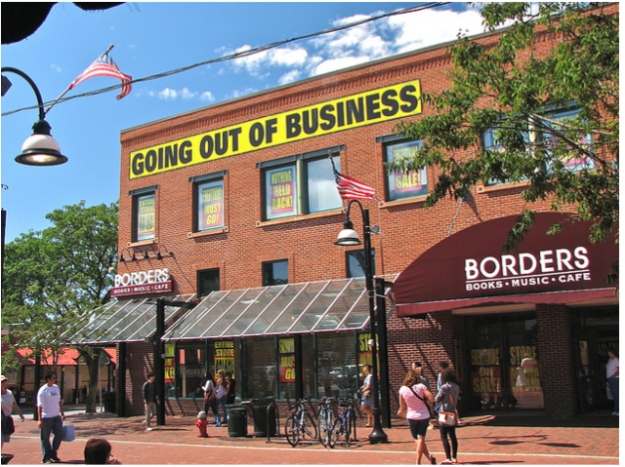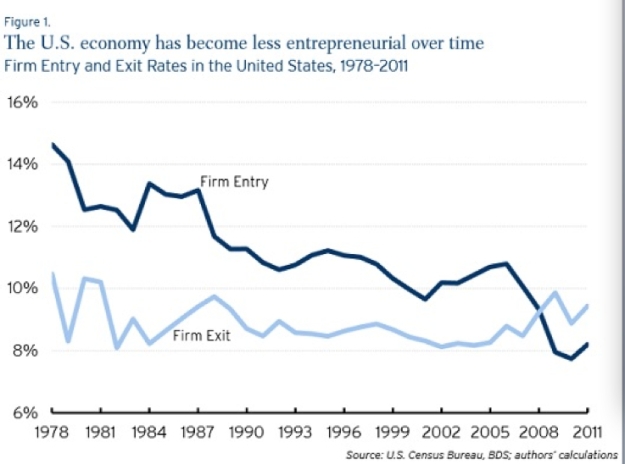We’re 650,000 Start-Ups Shy of a Revolution
- 3,331
- 89Likers
- 14Comments
Here is a shocking statistic, which has walked right by most mainstream media without much notice: According to the 2011 Census, for the first time in recorded history (since 1978), there were more small business deaths in America, than small business births.
If we don’t turn this around, America’s years as the world’s super power are numbered. That said, I see a rainbow, following this storm. In fact, you cannot have a rainbow, without a storm first.
According to Gallup research, 70% of all jobs in America come from small businesses with five hundred or fewer employees, and half of all jobs in America come from small businesses with one hundred or fewer employees.
Gallup Chairman and CEO Jim Clifton adds, “There are approximately six million small businesses in the United States, and they are the very backbone of the country’s democracy. Those businesses fund significantly more American jobs and [gross domestic product] than big business does.”
For nearly eight years running, America hovered at around 400,000 start-ups per year, and most recently that number dipped troublingly to 350,000 in the last year reported. But, according to Clifton, we need approximately one million small business start-ups per year to lift up our country’s economy, create jobs, and sustain our prosperity.
That means we are about 650,000 start-ups short, and I believe that a good number of these small businesses can come from populations that have been left behind, ignored, or massively misunderstood and underestimated.
But the need for these small businesses is even more basic in the places and neighborhoods with which I am most concerned. These communities have enormous unmet needs for everything from traditional banking to gas stations to quality food and even entertainment. The U.S. Department of Agriculture’s Economic Research Service estimated that 23.5 million people live in “food deserts” located more than one mile from a large grocery store.3 More than half of these people (13.5 million) are low income, and thus there is a great need to set up markets and grocery stores in many communities. Meeting that need is one of the ways in which the poor can help save capitalism while also helping themselves.
And, of course, these communities also have untapped human capital—including those “unethical American entrepreneurs”—that can be leveraged in a number of positive directions to produce effective economic energy.
So we are talking both an underserved consumer population for quality goods and services, and an almost completely unrealized level of potential individual enterprise development. In my new bestselling book, How The Poor Can Save Capitalism: Rebuilding the Path to the Middle Class, I detail several very simple and straight forward ways that the average person can help America — and themselves — to accomplish outsized success again.
Gallup–HOPE Index and Gallup Student Poll results for 2013 showed that today’s low-income youth are more likely than their wealthier peers to develop problem-solving skills. In households earning less than $36,000 a year, about 47 percent of youth reported using their imagination every day at school, compared with 35 percent of youth from households earning $90,000 or more annually.
Likewise, nearly 51 percent of youth from the lower-income household group reported learning new ways to solve problems at school, compared to 43 percent of youth from higher-earning households. The poll also showed that traditional minority groups have a higher propensity toward entrepreneurship than their mainstream counterparts.
This makes perfect sense, because youth from low-wealth communities are forced to have much stronger coping skills to deal with difficult people and difficult situations, and, unfortunately, they are often forced to make adult decisions well before their time. Just as loss creates leaders, so too does this sort of sustained adversity management create and cultivate a personality that better manages less-than-perfect circumstances.
These youth can turn the traditional challenges associated with low-wealth environments into a new strength, assuming that their spirits are not crushed in the process.
This of course means that these youth would make impressive employees for traditional employers, and there is a place for government to incentivize major corporations to establish appropriate business units, such as call centers, employing large numbers of people in these same communities.
But it also means that these youth would be great potential entrepreneurs. Given that youth and adults from low-wealth communities don’t often have investable financial resources, their paid-in capital will typically come in the form of sweat equity and hustle. Jobs that rely heavily on these two attributes include sales and marketing (including multilevel marketing), a range of service businesses, and skilled professions such as plumbing and electrical services, construction, and carpentry.
Poor urban, inner-city, and rural communities have something else in common: you will find no Fortune 500 companies there. Mainstream and upscale communities have service providers on every corner, whereas the underserved communities I am talking about have unmet needs at every turn.
The so-called experts argue that there is no money in these communities to purchase the items that such businesses are selling, but it is precisely the meeting of these needs that will unlock the buying power of these places—both current buying power, including money currently circulating in the underground economy, and the future buying power resulting from increased employment opportunities.
Meeting these needs stabilizes communities, and this, along with good schools, attracts more residents.
In this way, even the most low-tech businesses, the most basic enterprise development, and the smallest of enterprise operators can help to create jobs, increase gross domestic product, and stabilize communities.
We can change the world, revitalize America, create a new era of jobs — and spark a new American Revolution. One centered on my new definition of freedom — self determination.
Let’s go….
Excerpt From: John Hope Bryant. “How the Poor Can Save Capitalism.” iBooks.

John Hope Bryant is the Founder, Chairman and CEO of Operation HOPE and Bryant Group Companies, Inc. Magazine/CEO READ bestselling business author of LOVE LEADERSHIP: The New Way to Lead in a Fear-Based World (Jossey-Bass), and is the only 2010-2012 bestselling business author in America who is also African-American.His newest bestselling book is HOW THE POOR CAN SAVE CAPITALISM(Berrett Koehler Publishing). Bryant is a Member of the U.S. President’s Advisory Council on Financial Capability for Young Americans, and co-chair for Project 5117, which is a plan for the rebirth of underserved America.
Follow John Hope Bryant on LinkedIn Influencers here.
Photo Credit: Don Shall
- Featured on:
- Economy
- Entrepreneurship & Small Business

